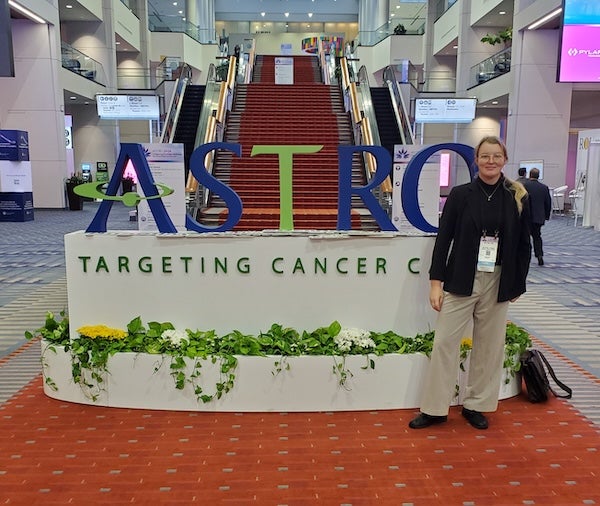Cells all over the human body have hundreds of mutations—most of which never lead to cancer. But some do. Nic Fisk, assistant professor of cell and molecular biology, uses computational biology and bioinformatics to understand the nuances of why. They research the applied use of techniques such as phylogenetics—the study of how things are related to one another as evidenced by their genetics—to address a wide-range of medical questions. At URI since 2023, their lab largely focuses on cancer.
“To me, evolutionary theory is the closest thing we have to a fundamental theory in biology (like the theory of gravity in physics),” Fisk says. “It describes how things are related to one another and how those relationships change through time. Coupled with a molecular understanding of biology, it allows us to do a sort of archeology into a fundamentally unobservable biological past.” The jump to applying this theory to medical questions and issues is a natural extension, they note. “By the time someone gets sick, a whole swath of relevant events happened between when they were well and when they arrived at a doctor—all of which we can’t or didn’t observe,” Fisk says. “We are left again to infer things about a fundamentally unobservable biological past. Evolution, phylogenetics, and bioinformatics are tools in a molecular archeology of disease.”
Fisk’s work has found a receptive audience outside of academia: practicing physicians. Earlier this year, they presented at the American Society for Radiation Oncology conference. “I was the only non-medical doctor on the panel of presenters, but was very grateful to be able to teach physicians about how phylogenetics and evolution can tell you so much about a patient and can guide treatment strategies,” they say. “It was also very valuable to see what medical professionals care and think about and struggle with. Collaborative work should be mutually beneficial, and it really helps to know what problems these physicians face on a day-to-day basis—especially so I can be a better partner in research.” They add that it’s not enough to simply know or discover something: “You need to be able to communicate with people who can do something about it or build on your contributions.”
Fisk’s contributions are apparent in the collaboration of the new Brown Center for Clinical Cancer Informatics and Data Science, which was co-founded by Drs. Sanjay Mishra, Jeremy Warner, and Ece Uzun. In addition to those three, the faculty is composed of Drs. Eric Carver, Zhicheng Jiao, and Fisk. “We all come at cancer from different vantages, but with the common tools of computation and data science,” Fisk says. “Dr. Warner is a medical doctor and focuses on EHR data, Dr. Carver is a board-certified clinical radiotherapy physicist, Dr. Jiao works a lot on machine learning and medical imaging, Dr. Uzun is a Director of Clinical Bioinformatics and does molecular pathology work, and Dr. Sanjay Mishra is very accomplished as a researcher and award-winning science writer and communicator. The center has cultivated a very deliberate diversity of folk who are working to combat cancer using computational tools.”
The intersection between informatics systems, scientific knowledge, and health treatments is not without systemic issues. As Fisk notes, data science is notorious for inheriting human biases and shortcomings that shape–but can be hidden by–the layers of math and programming. “The reception to my work varies on how well I can describe it, how well I address this bias, and how transparent I can make my work,” they say. And while Fisk’s work illuminates the power of science to solve pressing medical issues, they recognize that improving cancer outcomes requires additional factors. “Not all discoveries benefit everyone equally,” they say. “For instance, for a patient’s tumor to evolve resistance and recur, they needed access to therapy at the first instance. Proximity to a NCI designated cancer center, wealth, historical and personal exposure to racism, and many other social factors can be more determinative of patient outcome than the molecular basis by which their cancer evolved.”
In Fisk’s lab at URI, undergraduate students learn programming as a means of studying cancer. This semester, their projects include researching the molecular basis of prostate cancer disparities in men of African ancestry, lung cancer resistance to immunotherapy, natural language processing analysis of therapeutic strategies, molecular etiology of health disparities in breast cancer, and characterizing the evolution of recurrent glioma. “I was inspired by the power of evolution to answer the most difficult biological questions, guided by an ethic to help others, and supported by kind, patient, and understanding mentors—the sort of mentor I hope to be for students here at URI,” Fisk says. While their lab is still new and growing, Fisk notes that their central tenets are clear: to do right by collaborators, colleagues, mentors past and present, and patients who are served by the research. “If you’re a student interested in this sort of work,” they add, “please come chat with me.”

